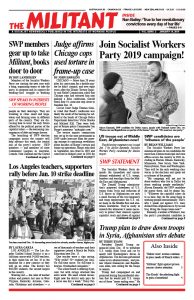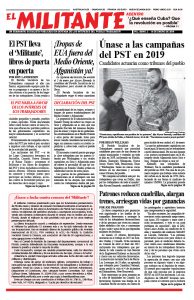CHICAGO — More than 28 years after his conviction for a double murder he didn’t commit, and over eight years after the Illinois Torture Inquiry and Relief Commission ruled that Chicago cops had tortured him into making a false confession, Gerald Reed, now 54, came one step closer to freedom Dec. 19.
Circuit Court Judge Thomas Gainer ruled that Reed’s confession was likely the result of the beating he suffered at the hands of Chicago Police Department detectives Victor Breska and Michael Kill. They were both part of former police Commander Jon Burge’s notorious “midnight crew.”
The torture inquiry commission was set up by the state government in 2009 under pressure from the growing outrage at continuing revelations about decades of Burge’s torture and frame-up operations. Burge, who died in September, was fired in 1993 and convicted in federal court in 2010 for obstruction of justice and lying about his years of torture. He was sentenced to four and a half years in prison.
In 2015 the Chicago City Council voted unanimously to acknowledge the cops’ use of electroshock, beatings, suffocation and Russian roulette and set up a special fund to pay reparations to victims of Burge’s brutality.
Reed, who is African-American, appeared in court in a wheelchair, the result of an injury he sustained after being arrested for the 1990 murders of Pamela Powers and Willie Williams and the subsequent brutality-marked “interrogation” by Breska and Kill.
Reed described how the two detectives shouted racist epithets as they threatened him with the death penalty. He said that Breska knocked a chair out from under him and repeatedly kicked Reed in the right leg, dislodging a metal rod that had been implanted after he suffered a gunshot wound years earlier.
Reed testified that the beating stopped only when Kill, who had been out of the room, returned and pulled Breska off him. Kill never reported the beating. Medical records showing that Reed suffered the injury after his arrest did not surface until more than 20 years later.
Judge Gainer rejected attempts by Cook County special prosecutors Robert Milan and Lawrence Rosen to discredit Reed’s claim that he was tortured. Gainer said correctional officer Clarence English testified he had seen Reed laying on the floor in the jail. Reed told English he had been beaten by police.
Nonetheless prosecutors announced Dec. 21 they would press forward with their frame-up case against Reed. He remains in jail pending a bond hearing Jan. 9. Prosecutors said they would fight against Reed’s release.
“The conclusions of the torture commission clearly show that Gerald Reed’s claim of torture, which he first made in 1992 when he tried to get his confession thrown out, is credible,” Andrea Lyons, Reed’s former attorney, told the Militant after a 2012 court hearing. “In fact, the report clearly shows that not only was he coerced to confess, but other witnesses were coerced into giving false testimony against him.
“Without the confession and the false statements, the state has no evidence,” she said.
In a separate case, Arnold Day, another African-American from Chicago’s South Side, won his freedom Dec. 19 after Judge Peggy Chiampas ruled that he was forced by other cops in Burge’s “midnight crew” to make a false confession to two murders he didn’t commit.
Chiampas had overturned Day’s conviction the day before, two years after the torture inquiry commission ruled his claim of torture was credible. Prosecutors in Day’s case agreed not to refile charges against him and he was released after nearly 25 years behind bars.

